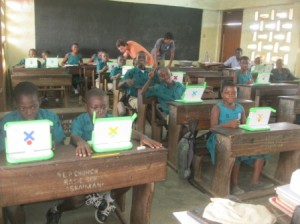Separate from the national program being rolled out in Eastern Ghana, Princeton University has a student-run Ghana School Library Initiative which is building a physical library in Ghana stocked with books and OLPCs.   This program started in 2008, and is one of three projects coordinated by the Princeton University chapter of Engineers Without Borders. They shared an update with East Coast OLPCers this Spring, and have been writing about their new milestones this summer, as the library nears completion.

After some work earlier this year to repair and update some donated XOs, children have started working with their own laptops at the EP Basic school in Ashaiman, Ghana, where the team is working. They recently completed a week of physical construction and two classes a day with the students.  The classes included working on educational activities with the children in Sugar, “to whet their appetites” to use the XOs more on their own.
